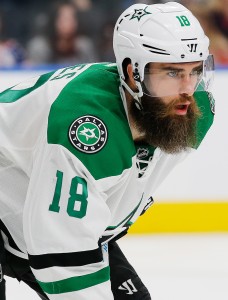When Patrick Eaves re-signed with the Dallas Stars last summer, it didn’t seem like anything spectacular. He was a 32-year old third line winger taking another one-year deal to stay in Dallas. He’d done it the past two years, and was actually taking a pay cut this season. We even included him on the “Minor UFA Signings” list, because of all the bigger deals that happened on July 1st. We were wrong, and so was just about everyone else. 
You can forgive us though, as after all Eaves’ previous career high in goals was 20, and had happened over a decade ago during his rookie season at age 21. He hadn’t even cracked 15 since, with several seasons in single digits. He quite simply was a minor UFA signing at this point, able on the penalty kill but not expected to do much else. A defensive forward who could be relied on to work the tough minutes and allow players like Tyler Seguin and Jamie Benn to produce offensively against weaker opponents.
Instead, Eaves won a job alongside those superstars and on the powerplay, resulting in immediate production. In his first 25 games, Eaves had 10 goals and 18 points, almost half of which came with the man advantage. Dallas had found something, and despite their team struggles this season Eaves has had a year to remember.
At the deadline Eaves was sold off to the highest bidder, that team proving to be the Anaheim Ducks, who were desperate for a winger to play with Ryan Getzlaf. The Stars would recoup a second-round pick—that could become a first—for what was initially considered a “minor signing”. Eaves wouldn’t disappoint as through 15 games with his new club he has another seven goals, all of which coming at even strength. He’s up to 28 now on the season, and with just two more in the final five games he could join some rare company.
Since the NHL came back in 2005-06, there have only been 28 players to score 30 or more goals in a season after the age of 30. Of that group, only five—Radim Vrbata, Mike Sillinger, Mike Knuble, Chris Clark and Mikael Samuelsson—were cracking 30 for the first time in their careers, as Eaves would be this season.
It’s interesting to note though, that the group doesn’t set a fantastic precedent. Three of those players were either immediately ineffective or out of the game entirely soon after, with only Sillinger and Vrbata providing any staying power. Perhaps Eaves will be an exception, but his performance this year should not signify some sort of newfound ability that will make him an effective option down the line. Both Sillinger and Vrbata both had much more previous offensive success, if falling short of the 30 goal mark. Teams should be wary of paying for this year’s production in the future.
But for now, Anaheim should be happy they jumped on board during his career year and Dallas should be ecstatic for selling high on a minor asset. For Eaves, it might never happen again.
